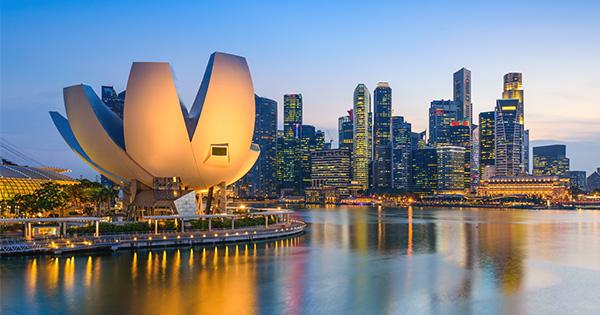In a recent survey assessing global happiness levels, Singapore has experienced a notable decline in its ranking among the world’s happiest countries, yet remains the leading nation in Southeast Asia. Despite the challenges highlighted in this year’s report, which evaluated factors such as income, social support, and perceptions of corruption, Singapore’s position as a regional beacon of stability and prosperity endures. This article delves into the findings of the survey, exploring the potential reasons behind Singapore’s slip in rank, the implications for its citizens, and the factors that contribute to its continued prominence in the Southeast Asian landscape. As discussions around mental well-being and quality of life gain momentum, the results offer valuable insights into the evolving narrative of happiness in a rapidly changing urban surroundings.
Singapore’s Decline in Global Happiness Rankings: Factors and implications
Recent reports indicate that Singapore has experienced a notable decline in its happiness rankings on a global scale, despite maintaining its status as the happiest country in Southeast Asia. Several factors contribute to this shift in sentiment among citizens.The rapidly rising cost of living, coupled with a high-pressure work culture, has created a challenging environment for many residents. Additionally, issues such as housing affordability and income inequality have further compounded feelings of dissatisfaction, making many Singaporeans reevaluate their well-being in a society known for its prosperity.
As Singapore grapples with these complexities, the implications of falling happiness levels cannot be underestimated. A decline in overall well-being may have far-reaching effects on various sectors, including mental health, productivity, and social cohesion.To illustrate this, consider the following table summarizing potential impacts:
| Area of Impact | Potential Effects |
|---|---|
| Mental Health | Increase in anxiety and depression rates |
| Workplace Productivity | Decreased employee engagement and efficiency |
| Social cohesion | Rise in social unrest and disconnect among communities |
Addressing these challenges will require concerted efforts from policymakers, community leaders, and residents alike. By focusing on enhancing quality of life through targeted interventions and support systems,Singapore can work towards reversing this trend and fostering a happier,more fulfilled populace.
Understanding the Southeast Asian Landscape: Singapore’s Continued Regional Dominance
despite a dip in its global happiness ranking, Singapore remains a pivotal player in the Southeast Asian landscape, showcasing its resilience and adaptability in the face of changing perceptions. The city-state’s unwavering commitment to economic stability, high-quality education, and a robust healthcare system contributes significantly to its regional prominence.Critically, Singapore’s effective government policies and forward-thinking city planning not only enhance the quality of life for its residents but also attract foreign investments and talent, reinforcing its position as a hub for international business.
Several factors underline Singapore’s dominance within Southeast Asia, including:
- Strong Economic Performance: The nation’s GDP growth continues to exceed regional averages, making it an appealing destination for multinational companies.
- strategic Location: Serving as a gateway between East and West, Singapore’s geographical advantages facilitate trade and commerce.
- Talent magnet: Its world-class educational institutions and diverse job opportunities draw skilled professionals from across the globe.
- Stable Government: A transparent and efficient government fosters a sense of security and stability for both locals and expatriates.
| Key Attributes | Impact |
|---|---|
| Economic Growth | catalyzes job creation and foreign investment |
| Innovation | Drives technological advancements and startups |
| Social Stability | Enhances quality of life and community engagement |
| Cultural Diversity | Fosters a vibrant society and cosmopolitan appeal |
strategies for Reversing the Trend: Recommendations for Enhancing National Well-being
To enhance national well-being and improve satisfaction levels among citizens, it is vital to implement a multi-faceted approach that addresses the various dimensions of happiness. Community engagement plays a crucial role; fostering a sense of belonging can significantly uplift the overall mood of the populace. Initiatives could include:
- Encouraging volunteerism: Create platforms for citizens to give back, enhancing community ties.
- Launching public awareness campaigns: Focus on mental health and well-being to reduce stigma and promote open discussions.
- Enhancing social activities: Organize community events that cater to diverse interests, creating spaces for interaction and bonding.
Along with fostering community ties, policy interventions aimed at reducing economic stress are essential. A focus on work-life balance can alleviate pressures that contribute to unhappiness. strategies to consider include:
- Implementing flexible work arrangements: Allowing remote work options to enable a better balance between personal and professional life.
- Enhancing support for families: Offering subsidies or tax breaks for childcare can relieve financial burdens.
- Promoting lifelong learning opportunities: Encourage skill advancement programs that empower citizens and adapt to a changing job market.
The Conclusion
while Singapore has experienced a slight decline in its position within the global happiness rankings,the city-state remains a beacon of well-being in Southeast Asia. Factors such as economic stability, social cohesion, and government policies contribute to its resilience in maintaining the top spot in the region. Still, the slip in ranking serves as a timely reminder for policymakers and citizens alike to address emerging challenges related to mental health, work-life balance, and community engagement. Moving forward, Singapore will need to actively foster an environment that supports holistic well-being to enhance the happiness of its residents and further solidify its stature as a leader in the pursuit of quality of life.


